Industrial revolution birthplace recognises climate change role
- Published
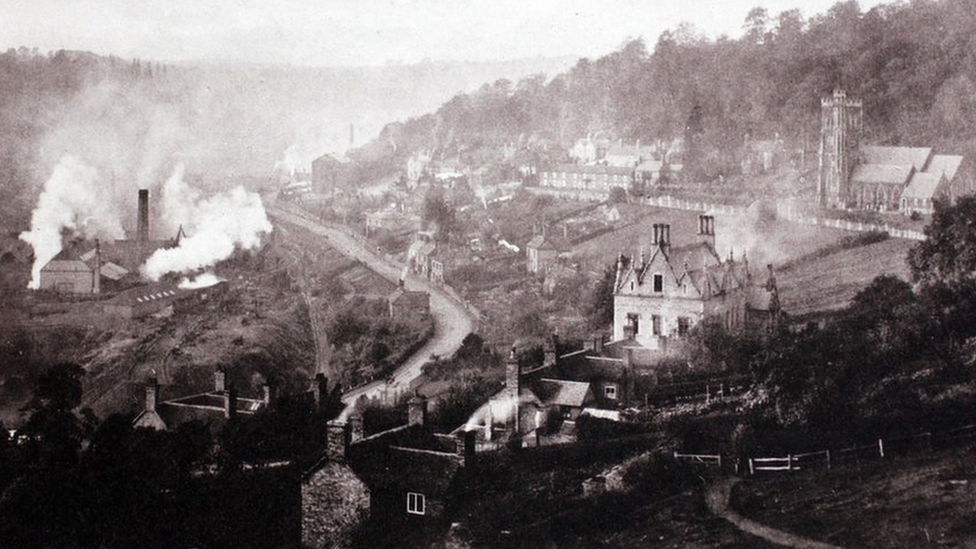
Coalbrookdale, within the Ironbridge Gorge, pictured in 1900 is often referred to as the cradle of the industrial revolution
Considered the birthplace of the industrial revolution, the Ironbridge Gorge is where, in 1709, Abraham Darby I smelted iron for the first time using coke, rather than charcoal, and the mass production of cast iron began.
Over the 18th Century, the gorge became the silicon valley of its day, attracting many of the country's greatest entrepreneurs, who would pioneer new technologies and change the way we worked, lived and travelled.
These early ironmasters of the gorge also set in motion industrialisation across the world, signifying a huge leap forward in man's impact on climate change.
Today, the Ironbridge Gorge is a World Heritage site, recognised by Unesco. It is also far from immune from the effects of climate change.
The Ironbridge Gorge Museums Trust, the custodian of much of the area's heritage, is updating its displays to include descriptions of how the innovations pioneered in the area led not only to the modern economy, but contributed to the warming of our planet.
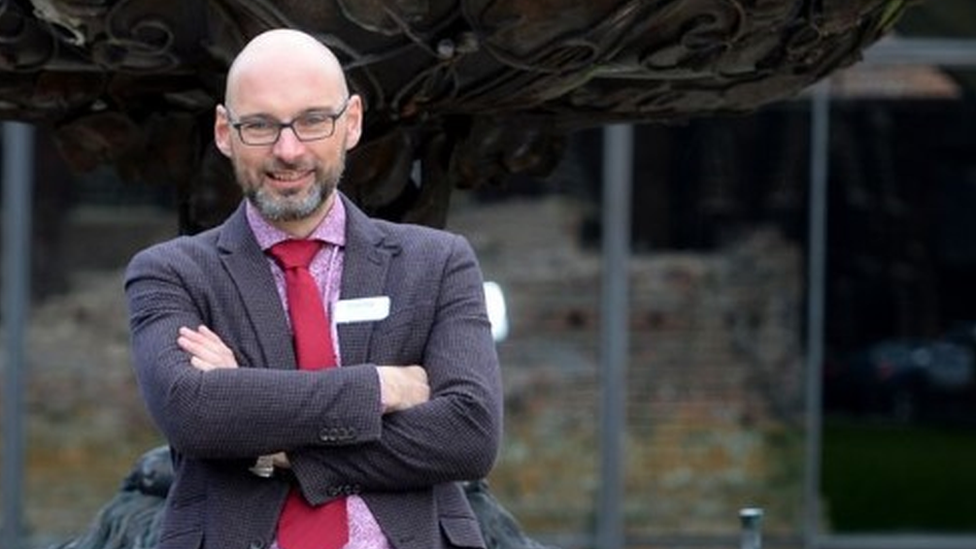
Nick Ralls says the sort of "ingenuity" epitomised by the early industrialists could help provide solutions to climate change today
Ahead of the COP26 climate change summit in Glasgow, the trust's CEO Nick Ralls said it was looking to the future while also remembering its history.
"The industrial revolution happened here in Ironbridge because we had all the ingredients in one place," Mr Ralls said.
"We had the entrepreneurs, people willing to experiment, all of the fuel, limestone and had everything here and that's why it happened.
"What they didn't know at the time is that while they were ushering in a new age, they were ushering in the start of [large-scale] pollution."

Innovation in the gorge
1709: Abraham Darby, a Quaker pot maker, began to make iron in Coalbrookdale in 1709 using coke as his fuel instead of the customary charcoal. His work also paved the way for Britain's foundry industry
1720s: Iron cylinders were cast for early steam engines
1729: Iron wheels for railway wagons were cast at Coalbrookdale
1787: John Wilkinson floated the first iron boat , external
1779: The first iron bridge is built by Abraham Darby III, with the village of Ironbridge growing around it
1802: Richard Trevithick builds the world's first steam locomotive
Source: Ironbridge Gorge Museums Trust

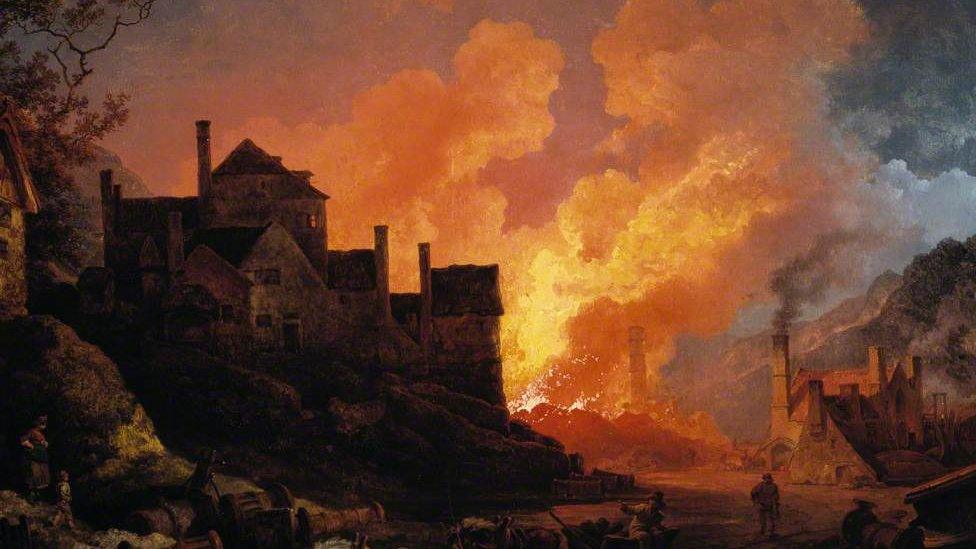
Once a rural idyll, tourists flocked to the gorge to experience the new sights and smells of industrialisation - some likened it to hades or hell
Analysis shows that for 800,000 years, atmospheric CO2 did not rise above 300 parts per million (ppm).
But since the Industrial Revolution, the CO2 concentration has soared to its current level of nearly 420 ppm.
The average temperature at the Earth's surface has also risen about 1.1C since 1850.
Multiple independent teams of scientists have reached the same result - a spike in temperatures coinciding with the onset of the industrial era.
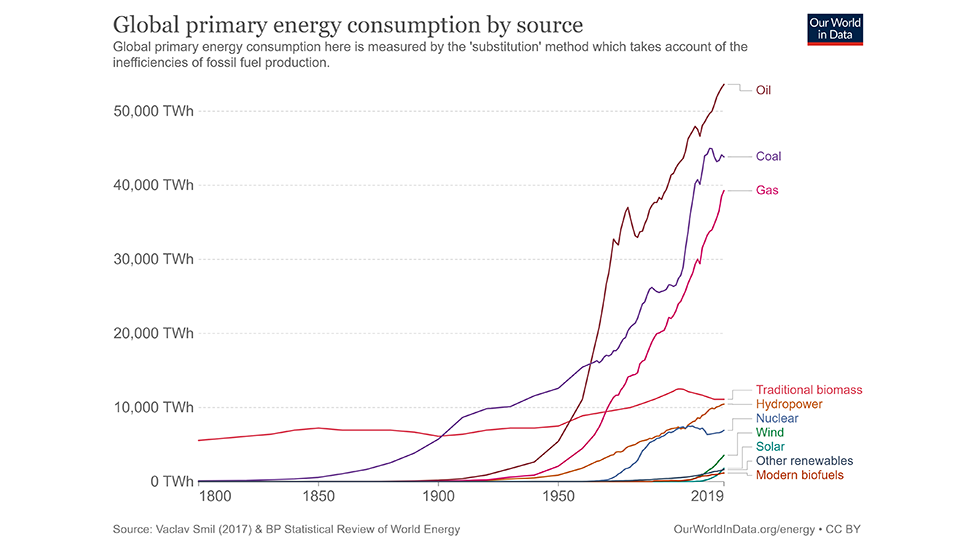
While the pioneers were experimenting and developing their "wondrous concepts", Mr Ralls said, little did they know the damage their processes would lead to in the long-term.
However, he said their spirit of innovation might also signify hope for the future.
'Human invention'
"Ironbridge is as important today as it has ever been," he said.
"Human invention will be the way in which we fix the climate, we see that now in the ways people are looking at different forms of transport... so many entrepreneurs are out there doing exactly what was done in the 18th Century here."
For today's scientists looking for solutions to climate change, Coalbrookdale inventor Thomas Parker could be a good model.
As well as pioneering fire grates designed to help tackle coal pollution, in 1884 he developed an electric car, which he used for his daily commute to work, complete with rechargeable batteries and a steam-powered recharger.

Analysis by David Gregory-Kumar, BBC Midlands Today science and environment correspondent
Standing right next to Abraham Darby's furnace in Coalbrookdale is an extraordinary feeling. Some 300 years ago this site marks the very start of the industrial revolution. Burning fossil fuels to manufacture everything from iron bridges to railways.
But of course as we now know burning fossil fuels produces CO2 which traps more of the sun's energy in our atmosphere which warms the planet causing our climate to change.
What Abraham Darby started directly leads to world leaders gathered in Glasgow at COP26 looking to take the next steps to tackle climate change. Decisions that could affect all our lives.
But the history of Ironbridge and the industrial revolution isn't just about pollution and climate change. It's also about amazing minds coming together and solving problems. Making life better for millions of people.
The history of Ironbridge still has much to teach us about the problems we face today.

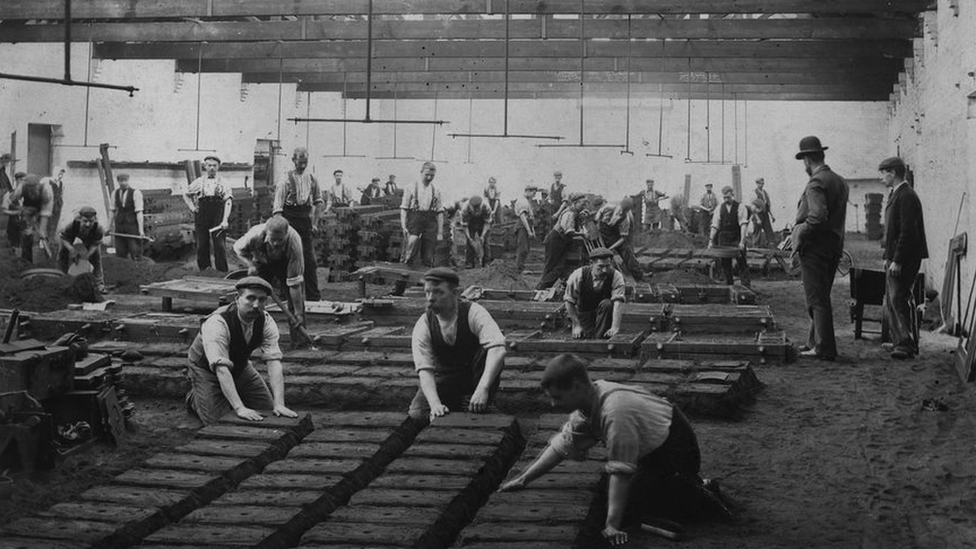
This photo taken in 1902 shows men at a Coalbrookdale foundry shaping moulds for molten iron. Darby had pioneered the technique for casting in the early 18th Century
For most people, the Ironbridge Gorge means Ironbridge (the town), but for most of the 18th Century, the latter did not exist. Instead it was Coalbrookdale, Broseley and Coalport at the centre of industry.
'Once in a generation'
Ironbridge itself was only created when Abraham Darby I's grandson Abraham Darby III built the world's first iron bridge across the river at the site in 1781.
Today, the town is right on the front line of climate change.
The Environment Agency said it was now regularly seeing flood levels in the area that would previously have been described as "once in a generation".
Just over a year ago some business owners saw their properties flooded for the fourth time in just four months, while residents in part of the town were evacuated at the peak of February 2020's floods.
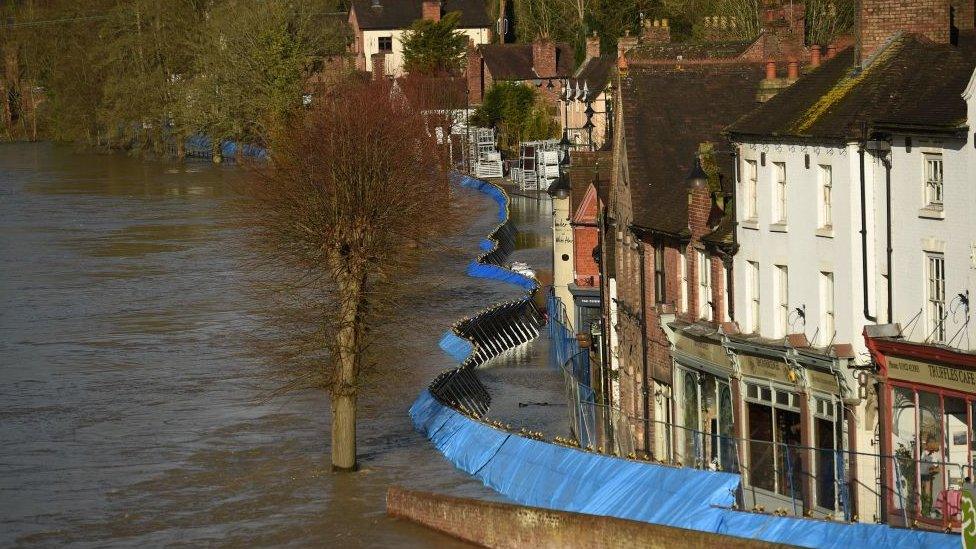
Alterations have since been made to flood barriers in Ironbridge that buckled under the weight of water from the Severn in February 2020
The gorge is also the focus of a huge, multimillion-pound land stabilisation scheme, in a bid to protect large sections of it from slipping towards the Severn.
In part, it is another legacy of man's impact on the environment - the area is littered with small mines created during the 18th Century to feed the forges.
Once people flocked to the gorge for the sights and smells of industrialisation. Today the area attracts tourists as much for its natural beauty as its heritage.
"In the 18th century people came to look at this remarkable place and even then they came to see the juxtaposition of industry and the beauty of the place with the River Severn," Mr Ralls said.
"Even at its worst, it was still a place of natural beauty and very dramatic, which people wanted to see.
"While Ironbridge itself was one of the first places to industrialise, it was also one of the first places to de-industrialise, and it is remarkable in the valley and the gorge how much nature has reclaimed."

The COP26 global climate summit in Glasgow in November is seen as crucial if climate change is to be brought under control. Almost 200 countries are being asked for their plans to cut emissions, and it could lead to major changes to our everyday lives.

Follow BBC West Midlands on Facebook, external, Twitter, external and Instagram, external. Send your story ideas to: newsonline.westmidlands@bbc.co.uk, external
Related topics
- Published28 October 2021
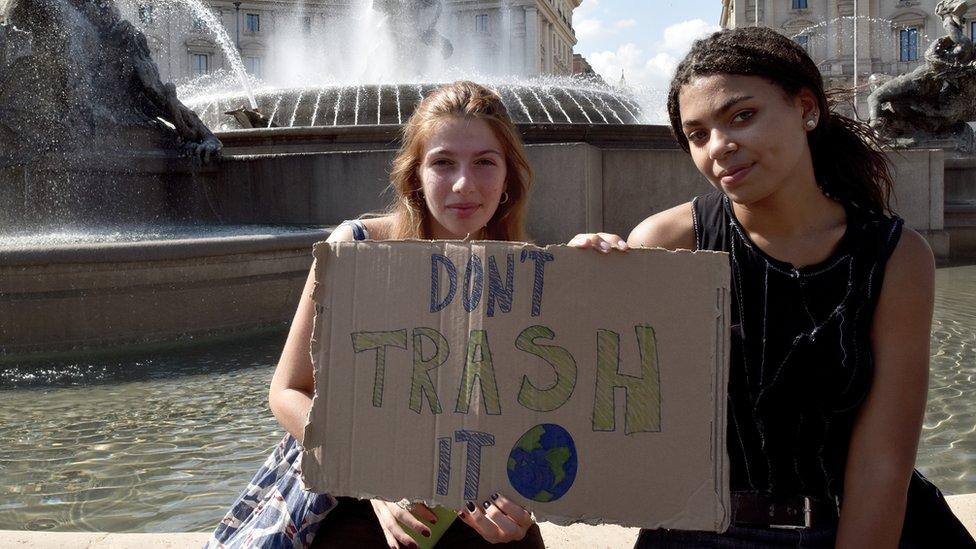
- Published25 October 2021

- Published15 November 2021
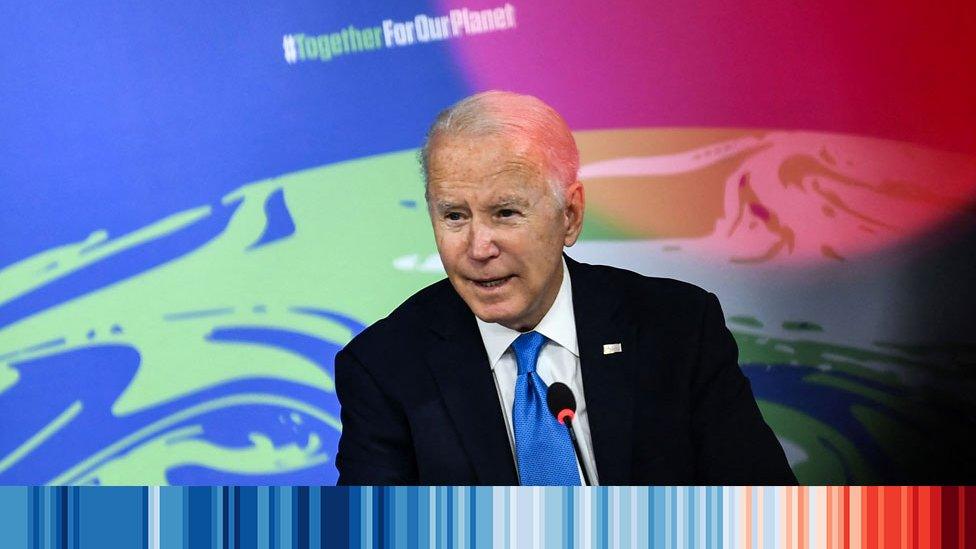
- Published25 February 2020
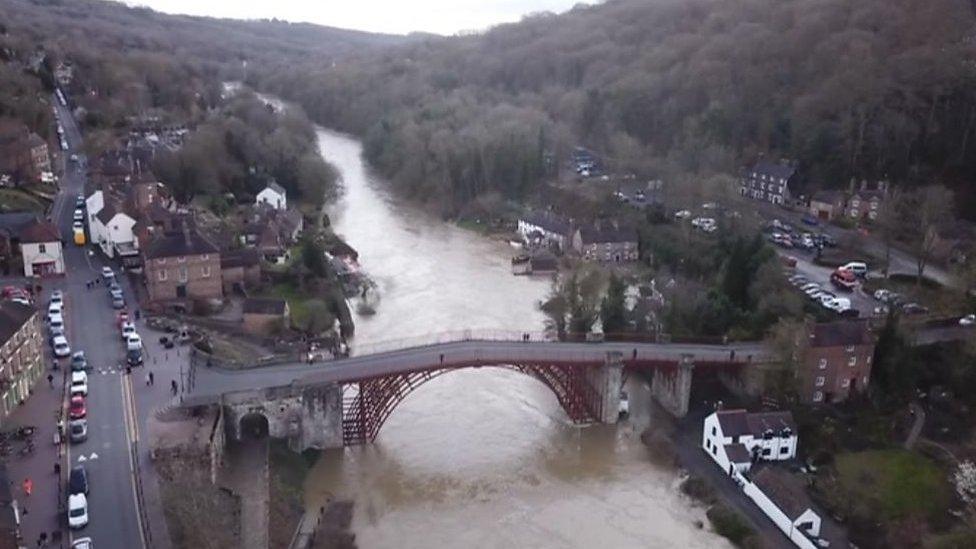
- Published20 September 2013
